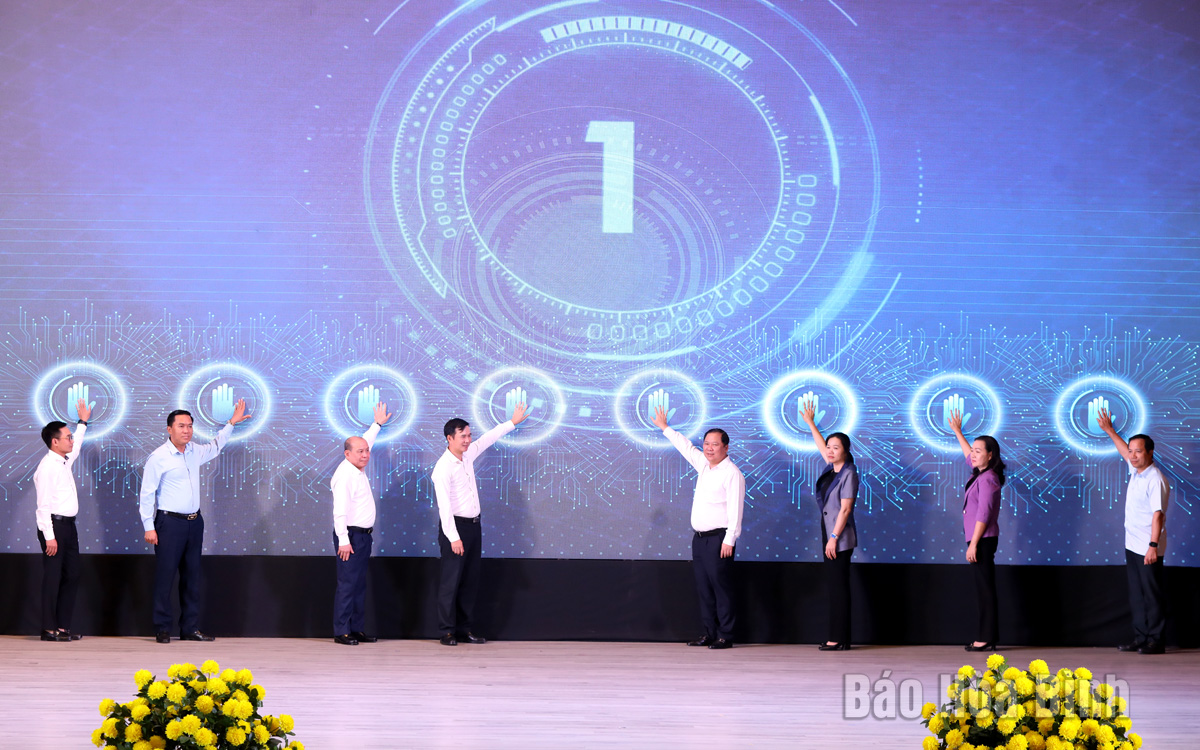
On May 15, the Hoa Binh Steering Committee for Science, Technology, Innovation, and Digital Transformation launched the "Digital Literacy for All” movement. The event was held both in-person and virtually, connecting provincial authorities with district-level Party committees and local communities across communes, wards, and townships.
Central and provincial-level officials
press the buttons to launch the "Digital Literacy for All” movement.
The event drew Bui The Duy, alternate Member of
the Party Central Committee and Deputy Minister of Science and Technology, as
well as senior officials from the National Authority of Digital Transformation.
Delegates at the provincial levels included Nguyen Phi Long, alternate Member
of the Party Central Committee and Secretary of the provincial Party Committee,
Bui Thi Minh, Permanent Deputy Secretary of the provincial Party Committee, and
Bui Duc Hinh, Deputy Secretary of the provincial Party Committee and Chairman
of the provincial People’s Committee.
Also present were provincial department leaders,
National Assembly deputies of Hoa Binh, business representatives, technology
experts, and local students and residents.
Attendees explored an exhibition featuring "Make
in Vietnam” technologies aimed at promoting digital government, economy, and
society. Companies such as VNPT Group, Viettel Group, FPT Corporation,
MobiFone, MISA, MedCAT JSC, Thánh Gióng Media & Computer Company, and Dell
Vietnam showcased technologies contributing to national and local digital
transformation, improving public services, governance, and economic
development.
The event reinforced Hoa Binh’s commitment to
the objectives outlined in Politburo Resolution No. 57-NQ/TW issued on December
22, 2024 by the Politburo on accelerating science, technology, innovation, and
digital transformation. By bringing together government leaders, businesses,
and experts, the festival aimed to ensure digital services are practical and
accessible to all citizens.
In his speech, Nguyen Phi Long, alternate Member
of the Party Central Committee and Secretary of the provincial Party Committee,
emphasised the role of science and technology in economic growth. He
highlighted the province's achievements, such as the 40% Total Factor
Productivity (TFP) in 2024 and the expansion of broadband internet, with 100%
of communes now connected to high-speed fibre-optic networks and 4G coverage
reaching 96% of areas.
Hoa Binh also deployed digital platforms across
all levels of government, improving service efficiency and accessibility. More
than 85% of administrative documents are now submitted online, and the province
consistently ranks in the top 10 for service quality.
Despite progress, Long acknowledged barriers to
digital transformation and stressed the need for continued awareness-raising
and training to make digital tools accessible to everyone, especially
vulnerable groups.
Bui The Duy, Deputy Minister of Science and
Technology, praised Hoa Binh’s implementation of Resolution 57-NQ/TW and
highlighted the importance of digital transformation in the province’s growth.
He noted that as the province continues to restructure and develop its economy,
digital tools will be crucial for progress.
Digital transformation is not about complex
technology but about practical solutions that improve daily life, Duy said,
calling for ongoing engagement from all sectors.
At the event, Hoa Binh’s police introduced the
VNeID app, which simplifies online public services. Youth volunteers, in
collaboration with local police and telecom companies, assisted residents at
Phuong Lam Market in using digital services.
Experts shared solutions for Hoa Binh’s digital
transformation. VNPT presented AI and big data applications for governance and
economic development. MISA showcased a "Make in Vietnam” platform to drive innovation.
FPT demonstrated smart cameras using AI and IoT
for security, while Viettel discussed a proactive e-governance platform for
smarter public services, MobiFone shared AI-driven tools for digital
transformation, and MedCAT introduced a platform to digitise unstructured data.
Hoa Binh province is undergoing a dynamic transformation amid Vietnam’s national digital transition. Building on Poliburo’s Resolution No. 57-NQ/TW on breakthroughs in science, technology, innovation, and national digital transformation, the province has rolled out a wide range of practical action plans. A standout initiative is the "Digital Literacy for All” movement, an effort to ensure that no one is left behind in the digital era.
Hoa Binh province is undergoing a dynamic transformation in the wake of the national digital transformation movement. Building on Resolution No. 57-NQ/TW of the Politburo on breakthroughs in science, technology, innovation, and national digital transformation, the province has implemented a wide range of practical action plans. A standout initiative is the "Digital Literacy for All” movement ambitious effort to ensure that no one is left behind in the digital age.
With a spirit of unity and proactive problem-solving, the Party Committee, the government and the people of Dong Lai Commune (Tan Lac District) have made great strides in implementing the resolutions of the 24th Party Congress of the commune for the 2020 - 2025 term. Focusing on leadership and practical actions, the commune has brought the Party’s resolutions into daily life, creating strong impacts and pushing the local development forward.
Amid the nationwide push for digital transformation, young people in Hoa Binh Province are stepping up as dynamic pioneers, applying technology to enhance Youth Union operations and expand the reach of youth-led initiatives. Through creativity and adaptability, Youth Union organizations at all levels have introduced a series of practical solutions, contributing to modern governance and community development.
In recent years, An Nghia commune, located in Lac Son district, has stepped up administrative reform, focusing on improving the quality and efficiency of its single-window service unit for receiving and processing administrative procedures. These improvements have helped create favourable conditions for local residents and organisations to handle administrative procedures, contributing to the commune’s broader socio-economic development.
The Prime Minister-approved master plan to develop the multi-use value of forests ecosystems through 2030, with a vision to 2050, aims to improve the management and sustainable use of forest resources, create jobs, increase incomes, and improve the living standards of ethnic minorities, people in mountainous and remote areas, forest workers and those living near forests.



